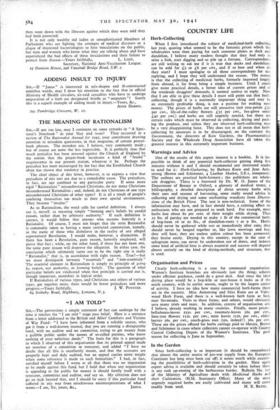THE MEANING OF RATIONALISM SIR,—If not too late, may I
comment on some remarks in " A Spec- tator's Notebook " in your May 2nd issue? They occurred in a review of The Rationalist Annual for 1941, your contributor drawing attention to mistaken quotations, in that magazine, of certain prayer- book phrases. The mistakes are, I believe, very commonly made ; but of course are none the less regrettable. It is perfectly true that much prejudice has been aroused against the Church of England by the notion that the prayer-book inculcates a kind of " feudal " acquiescence in our present station, whatever it be. Perhaps the prejudice has been encouraged by the fact that the Established Church often has shown that tendency in practice.
The chief object of this letter, however, is to express a view that prejudices of this sort are due to a remediable cause. The prejudices, in fact, are not confined to any particular party. If some more rigid "Rationalists " misunderstand Christians, do not many Christians misunderstand Rationalists ; and, indeed, do not Christians of one type misunderstand Christians of other types? It is all a result of people's confining themselves too much to their own special environment. They become " insular."
As to Rationalism, the word calls for careful definition. I always use it, myself, as meaning simply " forming one's beliefs by candid reason, rather than by arbitrary authority." If such definition is correct, it would follow that anyone who reasons honestly is a Rationalist. Of course, I must not forget that the term Rationalist is commonly taken as having a more restricted connotation, namely, as the name of those who disbelieve in the reality of any alleged supernatural Revelation. I would make, however, a distinction. If there has been a Revelation, pure reason, honestly employed, will prove that fact ; while, on the other hand, if there has not been one, the same pure reason will disprove the allegation. In either case, the conclusion which ultimately turns out to be the right one is really "Rationalist," that is, in accordance with right reason. . True!—but we must distinguish between " essentials " and " non-essentials " The essential element in Rationalism is simply its principle of going by reason, not authority, in forming beliefs. The question of what particular beliefs are vindicated when that principle is carried out is, though important, secondary in logical order.
If Rationalists of various types, and Christians and others of various types, got together more, there would be fewer prejudices and more
progress.—Yours faithfully, J. W. POYNTER. 64 Sotheby Road, Highbury, London, N. 5.






























 Previous page
Previous page